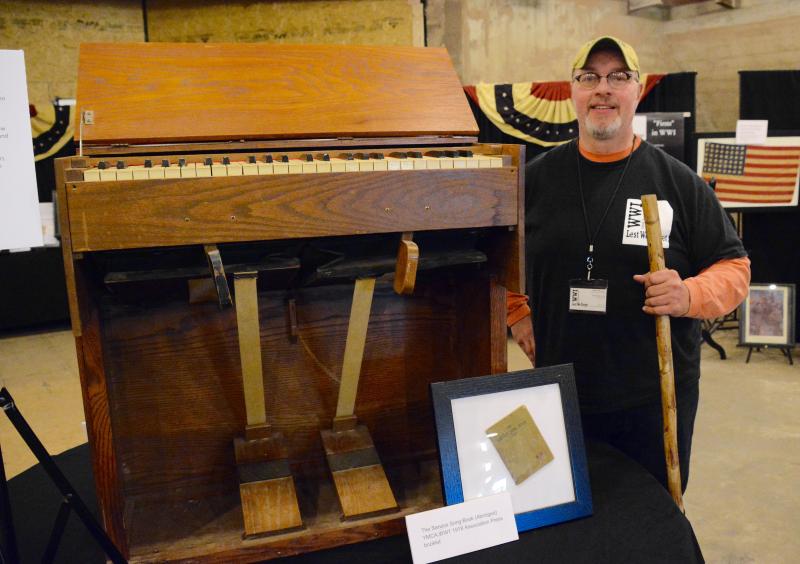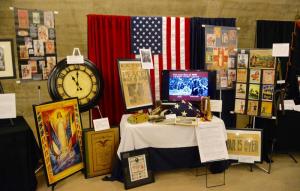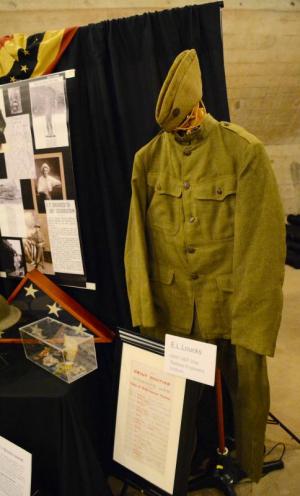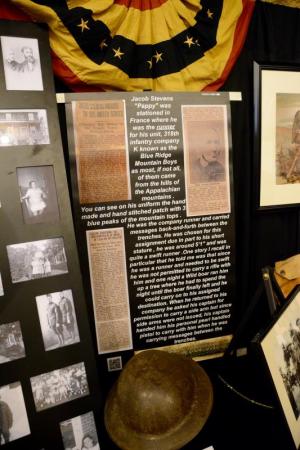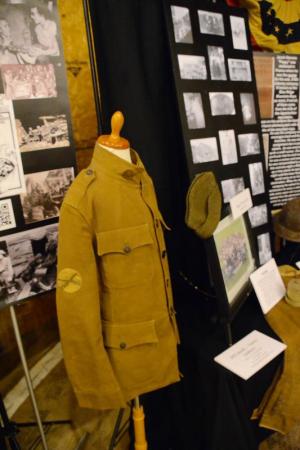As Keith Colley tells it, every artifact in his World War I Mobile Museum has a story.
There's the story of Jacob “Pappy” Stevens who was a runner carrying messages between trenches in France, which was one of the most dangerous tasks in the war. He was selected for the job because he was 5-foot-1 and was a fast runner.
Stevens' unit, the Blue Ridge Mountain Boys, came from the hills of Appalachia.
Included among the treasure trove of memorabilia are photographs of Stevens, his helmet and hand-sewn uniform and hat. There's even a recent photo of a Stevens family reunion.
Colley said the family learned about the museum and contacted him about their relative whom they considered a hero whose story needed to be told.
“He was a hero, and it's a miracle he made it back home,” Colley said.
Colley, who takes the museum around the country throughout the year, brought the exhibits for the second year to Fort Miles Museum in Cape Henlopen State Park. Colley said there is renewed interest in the history of World War I because this is the centennial year of the end of the war.
There's also the story of E.L. Loucks, who was too old for service but lied about his age to serve as a train engineer assigned to move troops in Europe. When he returned, all of the memorabilia he brought back from the war was inadvertently donated to the Salvation Army.
On a chance encounter on a train he was working on, he struck up a conversation with a solider in a World War II uniform. That total stranger had just come from a Salvation Army store after purchasing Loucks' war memorabilia, including his uniform. He gave it back to Loucks without hesitation.
Colley is constantly searching internet sites such as eBay for items to add to his museum. On one search, he purchased some of Loucks' memorabilia, including his uniform. “When the family found out I was displaying all of his things in a museum, they reimbursed all the money,” Colley said.
His most recent find was a rare, century-old trench organ used by troops in the field. “If you can find one, they are in bad shape. It' didn't play, but was in good shape being in storage. The family in Ranger, Texas, gave it to me as a donation,” he said.
During a stop at a museum in Houston, restoration staff spent their own off time repairing the organ.
Another recent addition is the front page of a rare 1918 Los Angeles Record newspaper declaring “Peace! The war is over.” What makes the newspaper rare, Colley said, is the declaration was made Nov. 7, three days before the war actually ended.
He said one of the most treasured pieces is a warning bell used to signal that gas was entering the trenches.
There's also a 48-star flag that belonged to his great-grandfather, a peanut farmer who was not permitted to enlist because farmers were needed at home to produce food.
During his research, Colley found a family connection to the war. Sgt. Harold Colley, a 23-year-old, was credited with saving 1,200 of his fellow soldiers on a French battlefield. He was shot and killed on the same day of the battle, Aug. 23, 1918.
The museum's roots
Colley, who recently purchased and moved into his grandfather's house in Marlo, Okla., spends about half of each year on the road.
Formerly a bereavement counselor, Colley was working with a patient who was unresponsive. “I knew his father was in World War I, so I found a shovel artifact from the war and placed it in his hand,” he said. “It opened up a world to him, and he started crying.”
The power of that encounter more than three years ago placed Colley on a new path – to start a traveling museum and take it to senior-oriented facilities. He dedicated his life to honoring and preserving the history of the war and its connection to families. Since then, he's had nearly 190,000 visitors. “I live and breathe history now, and I'm always learning,” Colley said.
During the week, volunteer docents from the Fort Miles Historical Association conducted tours of Battery 519, the location of the Fort Miles Museum. In addition, speakers provided talks on World War I-era topics.














